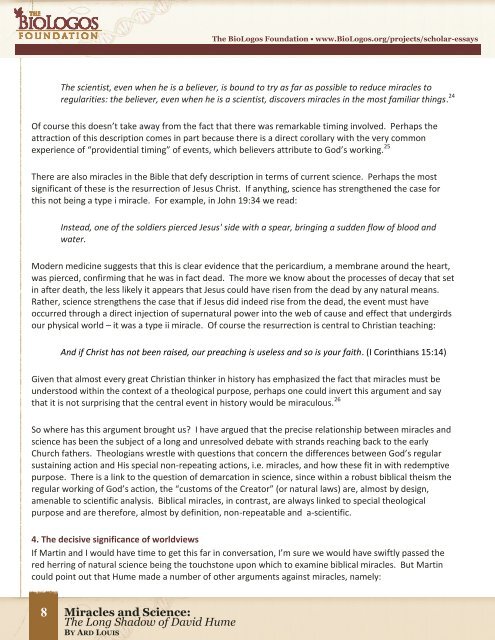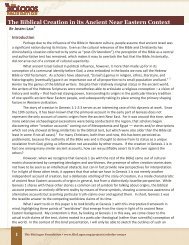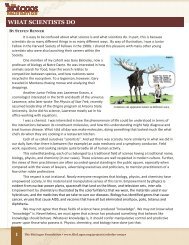Miracles and Science: The Long Shadow of David Hume - BioLogos
Miracles and Science: The Long Shadow of David Hume - BioLogos
Miracles and Science: The Long Shadow of David Hume - BioLogos
You also want an ePaper? Increase the reach of your titles
YUMPU automatically turns print PDFs into web optimized ePapers that Google loves.
<strong>The</strong> <strong>BioLogos</strong> Foundation • www.<strong>BioLogos</strong>.org/projects/scholar-essays<br />
<strong>The</strong> scientist, even when he is a believer, is bound to try as far as possible to reduce miracles to<br />
regularities: the believer, even when he is a scientist, discovers miracles in the most familiar things. 24<br />
Of course this doesn’t take away from the fact that there was remarkable timing involved. Perhaps the<br />
attraction <strong>of</strong> this description comes in part because there is a direct corollary with the very common<br />
experience <strong>of</strong> “providential timing” <strong>of</strong> events, which believers attribute to God’s working. 25<br />
<strong>The</strong>re are also miracles in the Bible that defy description in terms <strong>of</strong> current science. Perhaps the most<br />
significant <strong>of</strong> these is the resurrection <strong>of</strong> Jesus Christ. If anything, science has strengthened the case for<br />
this not being a type i miracle. For example, in John 19:34 we read:<br />
Instead, one <strong>of</strong> the soldiers pierced Jesus' side with a spear, bringing a sudden flow <strong>of</strong> blood <strong>and</strong><br />
water.<br />
Modern medicine suggests that this is clear evidence that the pericardium, a membrane around the heart,<br />
was pierced, confirming that he was in fact dead. <strong>The</strong> more we know about the processes <strong>of</strong> decay that set<br />
in after death, the less likely it appears that Jesus could have risen from the dead by any natural means.<br />
Rather, science strengthens the case that if Jesus did indeed rise from the dead, the event must have<br />
occurred through a direct injection <strong>of</strong> supernatural power into the web <strong>of</strong> cause <strong>and</strong> effect that undergirds<br />
our physical world – it was a type ii miracle. Of course the resurrection is central to Christian teaching:<br />
And if Christ has not been raised, our preaching is useless <strong>and</strong> so is your faith. (I Corinthians 15:14)<br />
Given that almost every great Christian thinker in history has emphasized the fact that miracles must be<br />
understood within the context <strong>of</strong> a theological purpose, perhaps one could invert this argument <strong>and</strong> say<br />
that it is not surprising that the central event in history would be miraculous. 26<br />
So where has this argument brought us I have argued that the precise relationship between miracles <strong>and</strong><br />
science has been the subject <strong>of</strong> a long <strong>and</strong> unresolved debate with str<strong>and</strong>s reaching back to the early<br />
Church fathers. <strong>The</strong>ologians wrestle with questions that concern the differences between God’s regular<br />
sustaining action <strong>and</strong> His special non-repeating actions, i.e. miracles, <strong>and</strong> how these fit in with redemptive<br />
purpose. <strong>The</strong>re is a link to the question <strong>of</strong> demarcation in science, since within a robust biblical theism the<br />
regular working <strong>of</strong> God’s action, the “customs <strong>of</strong> the Creator” (or natural laws) are, almost by design,<br />
amenable to scientific analysis. Biblical miracles, in contrast, are always linked to special theological<br />
purpose <strong>and</strong> are therefore, almost by definition, non-repeatable <strong>and</strong> a-scientific.<br />
4. <strong>The</strong> decisive significance <strong>of</strong> worldviews<br />
If Martin <strong>and</strong> I would have time to get this far in conversation, I’m sure we would have swiftly passed the<br />
red herring <strong>of</strong> natural science being the touchstone upon which to examine biblical miracles. But Martin<br />
could point out that <strong>Hume</strong> made a number <strong>of</strong> other arguments against miracles, namely:<br />
8<br />
<strong>Miracles</strong> <strong>and</strong> <strong>Science</strong>:<br />
<strong>The</strong> <strong>Long</strong> <strong>Shadow</strong> <strong>of</strong> <strong>David</strong> <strong>Hume</strong><br />
BY ARD LOUIS




